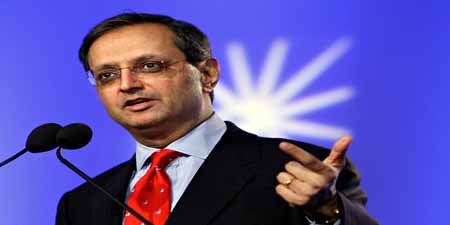 Nagpur News: In a surprise move, Citigroup announced on Tuesday that Vikram S. Pandit, the bank’s chief executive, had resigned, effective immediately.
Nagpur News: In a surprise move, Citigroup announced on Tuesday that Vikram S. Pandit, the bank’s chief executive, had resigned, effective immediately.
Mr. Pandit, 55, was born in Nagpur and had been the chief executive of Citigroup since December 2007. He was one of India’s shining overseas corporate success stories, part of a growing group of executives of Indian birth or ancestry who have led American institutions in recent years, and his unexpectedly fast departure has raised many questions, but answers, so far, are not forthcoming.
As IBNLive reports, Mr. Pandit left India for the United States when he was 16, earned bachelor’s and master’s degrees in electrical engineering from Columbia University and went on to get a doctorate in finance from the same institution. In July 2007, Citigroup acquired his hedge fund and private equity firm, Old Lane Partners, and Mr. Pandit took the top job at the company late that year.
In a 2007 interview with The Times of India, Mr. Pandit’s father, Shankar Pandit, talked about his son with pride after he was named Citigroup’s chief executive. “He was a brilliant boy,” the senior Mr. Pandit said. “In school, he always stood first in his class. He is very astute and focused. I saw him rise. Vikram has stood to my expectations. I am so happy that everyone is sharing my happiness, today.” He said his son was “a very simple person at heart” who “derives pleasures from simple things in life.”
In 2008, Outlook magazine wrote that the financial crisis had damaged the reputations of corporate leaders who had, until then, been the “faces of ‘India shining’ abroad.” “Thanks to the ravaging financial turbulence, Pandit could well be described as the most visible India-origin face for receiving bouquets and brickbats in equal measure,” the article said.
Old Lane’s history after Citigroup purchased it for $800 million was short and disappointing – the fund was shuttered in the summer of 2008 after losing money for investors.
The timing and the abruptness of the announcement Tuesday were surprising, but Mr. Pandit’s departure itself was less so. Questions about his appointment to the top spot were raised soon after he was named chief executive, Eric Dash reported in 2007. Mr. Pandit, he wrote then, is “known more as an analytical technocrat than a charismatic leader.”
Weeks before his resignation, “frustrations of the board members had been building,” Jessica Silver-Greenberg and Susanne Craig wrote in Dealbook Tuesday.
In a piece titled “Vikram Pandit Takes a Powder at Citigroup,” James Greiff of Bloomberg reports that many in the financial world had long thought that “Vikram Pandit was never the right man for the top job.” He says Mr. Pandit’s hedge fund background left him unsuited to running a commercial and consumer bank, and says his rise to the top was “by default as much as anything.” The Telegraph in Britain makes a similar argument in “Vikram Pandit: The academic ‘hedge fund guy,” noting that some also saw Mr. Pandit as “too timid and academic to run a global bank.”
His abrupt departure has sparked speculation about what lay behind it, in part because his resignation came a day after Citigroup announced stronger-than-expected earnings. The New Yorker writes of “The Mystery of Vikram Pandit’s Resignation,” noting that “it’s a bit unusual for the C.E.O. to quit without notice, effective immediately”.
The resignation followed “a clash with the board over strategy and performance,” according to The Wall Street Journal. The Economic Times reports that Citigroup directors replaced Mr. Pandit because they believed he had “mismanaged operations,” which led to “setbacks with regulators and a loss of credibility with investors.”
Analysts and investors have reacted with some consternation to the suddenness of the announcement, as NDTV reports. “Our view has always been that he was not really adding much value. So, in that sense we are not sorry to see him leave,” said Gautam Dhingra, chief executive and founder of High Pointe Capital Management in Chicago. “However, the abruptness of the resignation does cause a bit of worry. Why did it have to be an abrupt, rather than a graceful exit?”
Martin Mosby, a stock analyst at Guggenheim Securities, told NDTV, “If it was a natural transition of any sort, the timing would not be now. You would announce it in January and you would set up a transition period that would be completed in probably April.”
The Business Standard reports that investors had expected Mr. Pandit to remain, given the bank’s improved outlook. “I would have expected he wanted to stay around and see some of the fruits of his labors there,” said Peter Jankovskis, co-chief investment officer of Oakbrook Investments in Illinois.
Mint reports that while senior executives at Citigroup were shocked by Pandit’s departure, investors apparently were not sorry to see him leave, as Citigroup shares rose as much as 2 percent. “It’s not a shock that (Pandit) is no longer there, but the surprise is this is all happening very quickly. Why is he leaving immediately?” said Mike Holland, chairman of Holland and Co. in New York.
Mr. Pandit’s successor is Michael L. Corbat, former head of Citigroup’s European and Middle Eastern division.
In the statement announcing his departure, Mr. Pandit did not provide much more explanation: “Given the progress we have made in the last few years, I have concluded that now is the right time for someone else to take the helm at Citigroup,” he said.
















